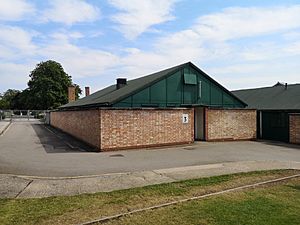Eric Malcolm Jones facts for kids
Sir Eric Malcolm Jones (born April 27, 1907, died December 24, 1986) was a very important British intelligence officer. He led a secret agency called GCHQ from 1952 to 1960. GCHQ is in charge of "signals intelligence," which means they listen to and understand secret messages from other countries to help protect Britain.
Contents
Early Life and War Work
Eric Jones was born in Buxton, England. He went to school until he was 15 years old. For twenty years, he worked in his family's textile business. Later, he started his own textile company.
When World War II began, Jones joined the Royal Air Force in 1940. He was sent to work in intelligence. In 1942, he went to Bletchley Park. This was a top-secret place where codebreakers worked to crack enemy messages.
Leading Hut 3
At Bletchley Park, Eric Jones was asked to look at a section called Hut 3. This hut was having some problems. Jones wrote a report about how to make it better. His ideas were so good that he was put in charge of Hut 3.
Hut 3 was very important. It was responsible for understanding secret messages from the German Army and Air Force. Even though Jones didn't have a background in math or codebreaking, he was excellent at organizing information.
Some people at Bletchley Park were "university men" and looked down on Jones because he didn't go to university. They even called him "The Manchester Businessman." But Jones proved them wrong with his skills.
Helping with D-Day
Jones played a huge part in the preparations for D-Day in 1944. D-Day was the massive invasion of Europe by Allied forces. He helped solve disagreements between the Army and Air Force teams in Hut 3.
Historian David Kenyon said that Jones's report on how different military groups needed to work together was key. It helped the Allies understand the huge amount of secret information they were getting. This teamwork was very important for the success of D-Day.
After the War
After World War II, Eric Jones went to Washington D.C. He represented British Signals Intelligence there. In 1950, he became the deputy director of GCHQ.
Two years later, in April 1952, he became the director of GCHQ. He held this important role until 1960. Under his leadership, GCHQ's intelligence was very helpful during the Suez Crisis in 1955. For his excellent work, he received praise from the Foreign Secretary.
After retiring, he worked as a director for an engineering company.
Recognizing His Contributions
In 2019, more details about Eric Jones's work at Bletchley Park were shared. An exhibition was created to show how important his contributions were to D-Day.
The exhibition highlighted how Jones organized and understood the huge amounts of data. This data came from German coded messages, which were cracked using machines like the Enigma machine. Jones's ability to put all this information together was crucial.
A leader at Bletchley Park, Peronel Craddock, said that Eric Jones was just as important as Alan Turing in this part of the war story. Alan Turing is a famous codebreaker. This shows how much Eric Jones's leadership in Hut 3 helped the war effort.


